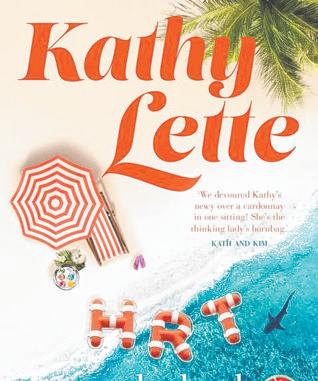
4 minute read
Book reviews
16 REVIEWS Daredevil heiress a wartime lifesaver
THE heroism of a daredevil Brisbane heiress who saved a former Russian president from Stalin and the Nazis is the rollicking tale shared by Australian biographer Susanna de Vries (pictured) in her latest book.
Advertisement
Destined to be 83-yearold de Vries’ last book about Australian women, the colourful story of Nell Tritton is her swansong, she says. She stumbled across the story while valuing paintings at Nell’s childhood home, Elderslie, now at Pullenvale.
Nell, an heiress to the Brisbane Tritton furniture fortune, married ex-Russian prime minister Alexander Kerensky in 1939. In 1940.
She courageously saved him from Stalin and the Nazis using her champion rally car driver skills during a harrowing journey on a cross-country escape.
“Nell lived an amazing life in Paris,” de Vries says.
“She was in danger of assassination by Stalin, along with Kerensky, but died on April 11, 1946, aged 49 in Brisbane. She is buried at Dutton Park Cemetery in South Brisbane.”
Nell drove the couple away from Paris as the Germans invaded, with Kerensky on Stalin’s hit list.
They eventually reached safety in the US, but with Nell’s life shortened by kidney failure aggravated by poor drinking water on their journey, they returned to Brisbane and Elderslie in 1945.
Tragically, Nell’s kidney damage started in childhood after drinking water from the lead-lined tank at their previous home.
In 1946, as Nell lay dying tended by her mother at Elderslie, Kerensky would stalk the verandas with a revolver to protect himself and Nell from Stalin’s
assassins. “After Nell’s death, Kerensky spent eight more months at Elderslie as he could not get a passage back to America,” de Vries says.
Kerensky eventually returned to the US and was made a professor of Russian history at Stamford University. He died in New York in 1970. Nell, The Australian Heiress who Saved her Husband from Stalin & the Nazis will be available from Amazon, Book Depository and Kobo.
Published by Pirgos Press, the illustrated book retails for $34.95.

MAY, 2020// SENIORS Diagnosis rips apart family ties
Poignant journey surprises
IF you think Lisa Ireland’s novel The Secret Life of Shirley Sullivan is a bit banal, keep reading; deep into the entertaining read are surprises.
The Australian author has based her book both on a newspaper story about an elderly couple running away from a nursing home and on a collection of letters written between her parents, and their photos.
The story swings between the couple’s life during the 1960s and the present, when Shirley walks her husband, Frank, out of his aged care home.
They embark on an adventure down memory lane and back to their marital home in Victoria.
Along the way she encounters the challenges of looking after a person with dementia; the humour and the sadness.
Shirley’s use of technology, her skilful management of relationships, and her deep love of Frank and her friend Rita, turn the adventure on its head several times.
– Published by Penguin. RRP $32.99. Also available in eBook and audio.
WHAT do you do when you’re told you have terminal cancer at 50?
Ruby has always been the generous mediator among her friends, family and colleagues, which is why they have all turned up to celebrate her 50th birthday.
But after a few too many glasses of champers, Ruby’s speech doesn’t exactly go to plan. Instead of delivering the witty and warm words her guests are expecting, Ruby reveals what she really thinks of every one of them.
She also accuses her husband, Harry, of having an affair. Saving the best till last, Ruby lambasts her mother for playing her three daughters against each other. It’s blisteringly brutal.
The birthday girl concludes with the throwaway comment that she has terminal cancer. Courageous? Or ruthlessly selfish? She has cashed in her life savings and plans on taking her two sisters cruising into the sunset for a dose of husband replacement therapy.
– HRT: Husband Replacement Therapy, by Kathy Lette.
Vantage, RRP $32.99

Insight into lingering price of injustice

DURING the Great War, law was used in everyday life as a tool to discriminate, oppress, censor and deprive many Australians of property, liberty and basic human rights.
A nation often amends its laws during war, not least to regulate life at home.
Yet few historians have considered the impact of the law on Australians during World War I.
In this original book, Catherine Bond breathes life into the laws that were central to the way people were managed in Australia from 1914–18.
Engaging and revelatory, Law in War holds those who wrote the laws to account, exposing the sheer breadth and impact of this wartime legal regimen, the injustices of which linger to this day.
More than anything, it illuminates how ordinary people were caught up in – and sometimes destroyed by – these laws created in the name of victory.
“Law in War gives us insights into the law and Australia’s Great War that Charles Bean declined to publish ninety-odd years ago,’’ Professor Peter Stanley said. “Pioneering, full of wonderful life and energy, the result has been worth waiting for.”
An associate professor at UNSW Sydney, Catherine Bond researches in intellectual property law, specifically copyright history; the relationship between law and war in Australia; and Australian legal history. She has published widely in leading Australian and international law journals on topics ranging from Crown copyright to plain packaging of tobacco products, to the introduction of a patent system in the Game of Thrones world of Westeros.
Her first book, Anzac: The Landing, The Legend, The Law, was published in 2016.





